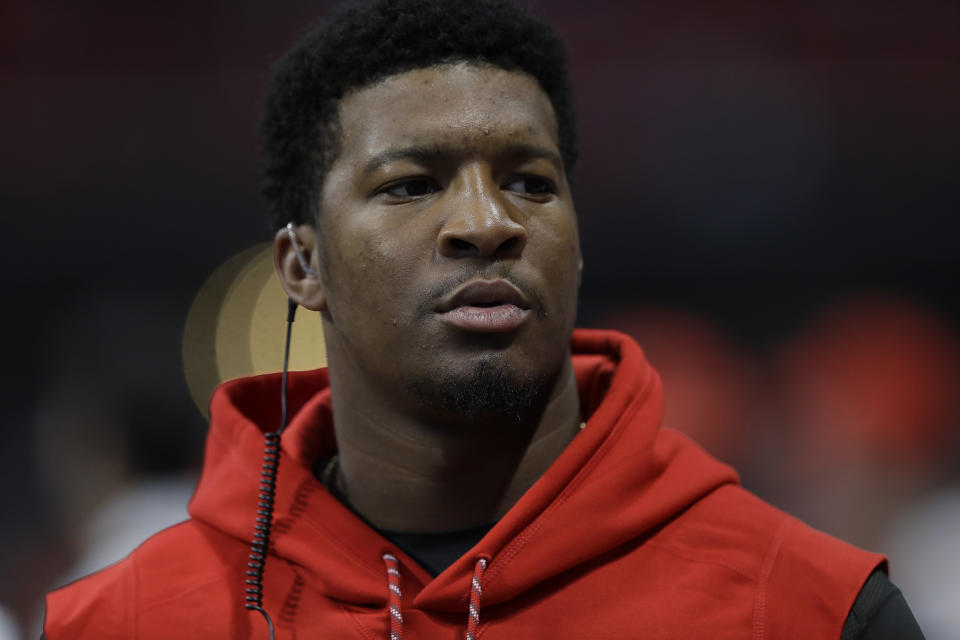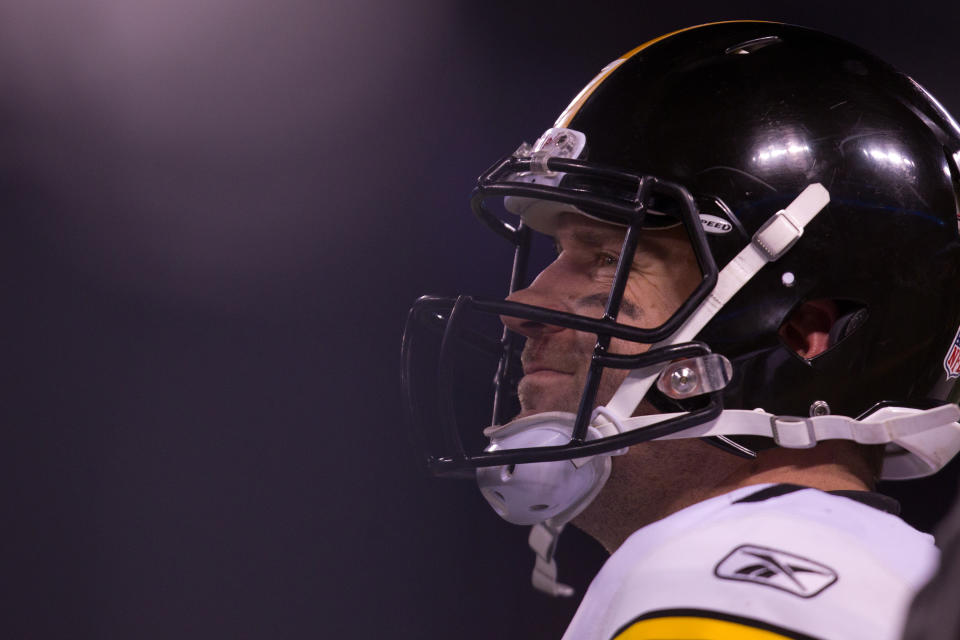Jameis Winston’s Uber case gives faint echo of landmark Roger Goodell decision involving Ben Roethlisberger
Jameis Winston addressed the latest allegations against him Thursday, and he was clear about his feelings: “I have no fear at all.”
The Tampa Bay Buccaneers quarterback is under NFL investigation after accusations that he groped an Uber driver in March 2016 while he was in Arizona. He said he “absolutely” feels he will be vindicated, and he even said he was vindicated of prior assault allegations made by Erica Kinsman while the two were students at Florida State. The attorney for the Uber driver, who also represented Kinsman, had no comment Thursday.
Winston’s confidence may be misplaced. Despite having never been charged with a crime, that has not prevented the league from handing down punishment in the past. And one turning point in the league’s recent investigative history came in a faintly similar case: a young quarterback accused of sexual misconduct and suspended without any arrest, charge or conviction.

That situation also started in the month of March. It was 2010, and a 20-year-old college student accused Ben Roethlisberger of sexually assaulting her in a Georgia nightclub. NFL commissioner Roger Goodell suspended the Steelers quarterback six games, despite the lack of any legal resolution. It turned out to be the beginning of a slippery slope that still defines Goodell’s tenure (and perhaps always will). But it was one of Goodell’s most successful disciplinary decisions in the commissioner’s career.
It’s hard to imagine now, but Roethisberger was quite unpopular in some Pittsburgh circles back then. Fans and even business owners were more than a little resentful after the allegation emerged. One bar owner told Yahoo Sports he banned the quarterback and added that he “needs an ass-whuppin’.”
Goodell ordered Roethlisberger to undergo a behavioral evaluation. He also left the door open for his own evaluation, threatening to add to the suspension if he deemed the quarterback unremorseful. He also allowed for the possibility of a reduced suspension for good behavior.
The commissioner’s letter to the quarterback read in part: “The Personal Conduct Policy makes clear that I may impose discipline ‘even where the conduct does not result in conviction of a crime’ as, for example, where the conduct ‘imposes inherent danger to the safety and well being of another person.’”
In the Georgia incident, Roethlisberger was accused of purchasing alcohol for an underage person (or facilitating that purchase), exposing himself in front of the college student, then following her in the bathroom and having sex with her.
Roethlisberger, like Winston, had a prior history and a civil suit: a Nevada hotel worker accused him of assaulting her in 2008. That suit was settled in 2012.
There are, of course, crucial differences between the cases: Winston is accused in this latest instance of groping, not rape. And the Georgia authorities looked into the Roethlisberger situation, giving the NFL some needed information. Scottsdale police have not started any investigation, and the Uber driver did not file charges. While the student in Georgia had witnesses supporting her account, the Uber driver so far does not. It was clear in 2010 that Roethlisberger had misbehaved to some extent. It is not as evident in Winston’s case.
Still, the outcome of the 2010 suspension is worth examining again. During the offseason, Roethlisberger and Goodell met at a New York airport and the commissioner decided to reduce the suspension to four games.

Over the past seven years, Roethlisberger has avoided trouble. Whether the punishment was a wake-up call is for Roethlisberger to say, but the results make the league look good. Steelers ownership made no objection to the commissioner’s decision, and in fact there were trade rumors involving Roethlisberger at the time.
Much has changed since then, of course. Back in 2010, there was far less public outcry over the consistency of Goodell’s punishments. The commissioner had banned Adam Jones for a full year, banned Michael Vick for six games (before reducing it to two), and suspended Tank Johnson for eight games. It all made some semblance of sense. In subsequent years, however, as the league has cracked down on domestic violence, the football community has grown querulous over some punishments seeming light and others harsh. The league’s adoption of an in-house investigative team, meant to placate critics, has done the opposite. It is hard to envision a player in today’s league accepting a punishment as readily as Roethlisberger did. And it is just as hard to imagine a team owner swallowing a lengthy suspension to a star player the way Art Rooney II did.
Still, hard evidence implicating Winston will make the situations quite similar and imperil the quarterback’s career in Tampa.
“I put my statement out there discussing this allegation,” Winston said Thursday, “and I’ve gotta respect the process [of the league investigation]. I’ve been vindicated several times on the past situation. So my statement on those accusations stand firm too. As always, it’s always a growing process in everything. And I’m going to continue to grow.”
If he didn’t do anything wrong, Winston has already shown some growth. If he did grope his accuser, the kind of turnaround Roethlisberger showed might be Winston’s only path forward.
More NFL on Yahoo Sports
